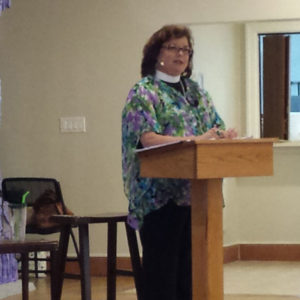Christ in us gives us the ability to help those who grieve
Imagine the pain of a friend who attended funerals with his brother, mourning the loss of close friends: 10 victims of the Pulse massacre.
Imagine a colleague’s shock as he explained he would miss work to attend a funeral for a family member who died from suicide.
Imagine a dear friend’s grief when her husband of 35 years died in his sleep, leaving her with two teenage children.
You would hurt for these people but struggle to know how to help them.
Answers for concerned care providers came on Saturday, July 16, at the Grief Workshop taught by Archdeacon Kristi Alday, dean of the Institute for Christian Studies. Alday, who holds a master’s degree in counseling, brought grief recovery experience from her former position as COO of Walking the Mourner’s Path, a national and international grief ministry. Her experience includes counseling mourners in New York City after 9/11.
More than 80 clergy and lay people filled the Cathedral Church of Saint Luke’s fellowship hall. The daylong workshop challenged attendees to accept this “do not flinch” ministry.
Alday encouraged listeners to come alongside and not recoil from anything the grieving person says. She instructed workshop students to use the terms death and died, not lost and passed on. “Grievers need to accept the reality of the loss,” Alday said. At the same time, people can listen, give a simple hug, and express genuine compassion to help grievers who might otherwise crawl into isolation because society wants them to get over it quickly.
Even Christian society.
Alday’s open forum outlined three phases of grief. She instructed the audience to listen to the way the person in grief tells the story of the loved one. The story reveals their phase of grief.
- Stage 1, Shock: The griever tells how their loved one died. Immediate details of the death.
- Stage 2, Suffering: The griever relates that they died. The facts.
- Stage 3, Recovering: The griever shifts to how they lived. Fond memories of the loved one.
During the initial grief phase, shock, the person’s ability to cope is limited to surviving. Their depth perception is off. They forget things.
During the suffering phase, 85 percent of people will abuse something: drugs, alcohol, food, exercise, and so on. Awareness that these behaviors are common helps the comforter to compassionately redirect the griever into a healthy outlet for their pain. For example, suggest a shopping outing or a lunch date. Offer to take a painting class together.
In the final phase, recovering, the griever will begin to share meaningful memories, such as a favorite vacation or the loved one’s hobbies.
Alday stressed that grief counseling requires allowing people time to grieve without placing them on a timetable. When pressed for a time frame she said the average person working through grief may take three years or more to work to a point of fond memories being the norm. Alday stressed the importance of allowing people as much time as they need and of validating the griever’s feelings without judgment or shock.
Even Christ expressed grief. Jesus cried when Lazarus died. He removed himself to be alone, seeking comfort from his Father upon hearing the news of his cousin John’s beheading.
At some point, we all meet someone in grief. Alday’s training affirmed that we have the Spirit of Christ within us and the ability to offer our comforting presence to a griever.
Further instruction will be available through a new book coauthored by the Ven. Kristen N. Alday and the Rev. Danielle D. Morris, titled 30 Days Toward Healing Your Grief, to be released March 2017. To order the book please visit www.churchpublishing.org/30daystowardhealingyourgrief.
For more live and online spiritual formation, education and training go to the Institute for Christian Studies.
Wendy Leech coordinates the production of the Central Florida Episcopalian and CFE Online. Recently experiencing the death of a close friend, Wendy sought to gain insight into the grieving process through this practical workshop.

